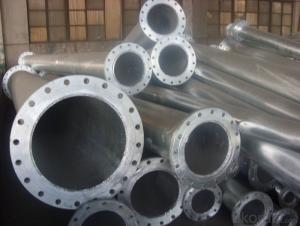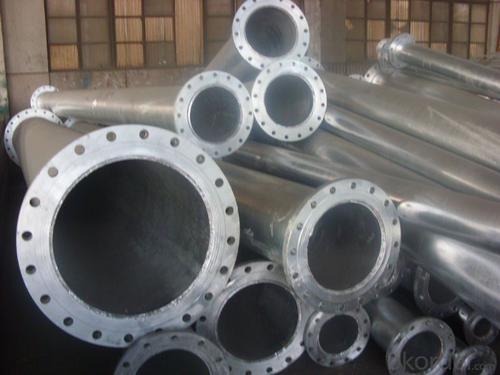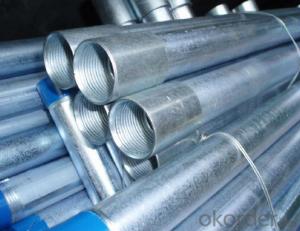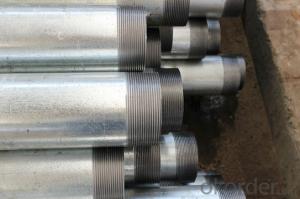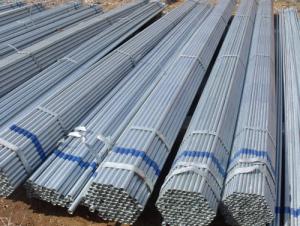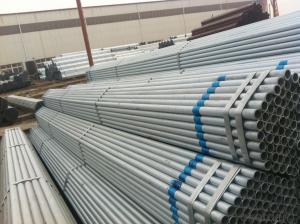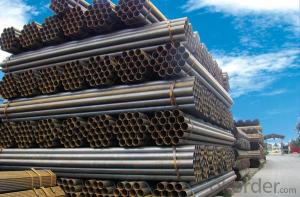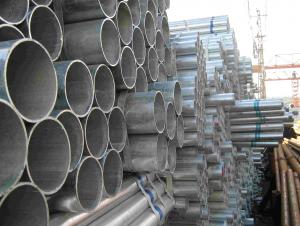hot dipped galvanized pipe with flanges
- Loading Port:
- China Main Port
- Payment Terms:
- TT OR LC
- Min Order Qty:
- -
- Supply Capability:
- -
OKorder Service Pledge
OKorder Financial Service
You Might Also Like
O.D | O.D tolerance | W.T | Thickness Tolerance |
1/2-12'' | ±0.3mm | 1.5-12 MM | ±8% |
Length | 3m,4m,5.8m,6m or according customers' requirements | ||
Certificate | ISO9001-2008,EN10210,API,Raw material cert,Mill cert,Reap on site inspection report,SGS,BV | ||
Standard | ASTM A53/ASTM A36 BS1387/BS1139/EN39/EN10219/EN10217/EN10297/EN10296/EN10025 etc | ||
Material | Q195/215/235/345, SS330/400/500, S235JR/S235JQ/S235J2, etc | ||
Inspection | With Hydraulic Testing, Eddy Current , Infrared Test, etc | ||
Technique: | Welded Hot rolled,heat extrusion | ||
Packing | in bundle or in bulk, PVC in blue or in strip | ||
Usage | For construction, Pluid and Greenhouse | ||
Main market: | Middle east,North and South America, East and West Europe, South and southeast Asia,Australia,Africa, | ||
Place of Origin | China | ||
HS code: | 73063090 | ||
Productivity | 2000Ton/Month | ||
Processing | galvanzied,inner and outer stab clean,bevelled oiled,painted black threading,with coupling and plastic caps protected packing in plastic cloths,3PE,FBE,corrosion resistant coating | ||
- Q: What does "HBB" glass steel pipe mean?
- HBB glass fiber reinforced plastic cable protection tube is suitable for power, communication and communication cables laying protection pipes in all kinds of occasions. Especially in the traffic crossing through cable and cable bridge across the river, the use of the special environment, more fully reflects its simple construction, high strength performance, widely used in the construction of infrastructure, transportation, electricity, communications and other fields of Civil Aviation Airport
- Q: How are steel pipes used in the manufacturing of automotive exhaust systems?
- Steel pipes are commonly used in the manufacturing of automotive exhaust systems as they possess high strength, durability, and resistance to heat and corrosion. These pipes are used to transport exhaust gases from the engine to the tailpipe, ensuring the safe and efficient operation of the vehicle. They are typically bent and welded together to create a complex network of pipes that helps direct the flow of exhaust gases and reduce noise levels. Overall, steel pipes play a crucial role in the construction of automotive exhaust systems, contributing to their reliability and longevity.
- Q: Are steel pipes suitable for underground irrigation pumping?
- Yes, steel pipes are suitable for underground irrigation pumping. Steel pipes are known for their durability and strength, making them an ideal choice for underground applications. They can withstand high levels of pressure, resist corrosion, and are less likely to be affected by external factors such as soil movement or temperature changes. Additionally, steel pipes have a longer lifespan compared to other materials, reducing the need for frequent replacements. However, it is important to ensure that the steel pipes are properly coated or lined to prevent corrosion and to regularly inspect and maintain them to ensure their effectiveness and longevity.
- Q: What are the factors affecting the cost of steel pipes?
- The factors affecting the cost of steel pipes include the price of raw materials such as iron ore and coal, the cost of energy and transportation, market demand and supply dynamics, currency exchange rates, manufacturing and labor costs, and any additional taxes or tariffs imposed on steel imports. Other factors may include technological advancements, regulatory compliance, and the overall economic conditions of producing countries.
- Q: What are the dimensions of a standard steel pipe?
- The dimensions of a standard steel pipe can vary depending on the specific application and industry standards. However, common dimensions include outer diameter (OD) and wall thickness (WT). For instance, a standard steel pipe might have an outer diameter ranging from 0.84 inches to 24 inches, and a wall thickness varying from schedule 5 to schedule 160.
- Q: Hot galvanized steel pipe for use?
- The use of hot galvanized steel pipe: mainly used for the delivery of gas, heating.In the greenhouse gas, heating, with the kind of pipe and galvanized pipe, galvanized pipe as a water pipe, produced a lot of rust in the tube, the outflow of water not only pollute the sanitary ware, and mixed with smooth inner wall corrosion caused by bacteria, heavy metal content in the water is too high, serious harm to human health. In 60s and 70s, developed countries began to develop new types of pipes, and galvanized pipes were banned. China's Ministry of construction and other four ministries have also issued a civilization, from two, 000 years since the prohibition of galvanized pipe, the current New District cold water pipe has rarely used galvanized pipe, and some of the hot water pipe is galvanized pipe.
- Q: How do steel pipes handle water hammer in high-rise buildings?
- Steel pipes in high-rise buildings handle water hammer by absorbing the sudden pressure surges caused by the rapid opening and closing of valves. The strong and durable nature of steel pipes allows them to withstand the impact of water hammer without experiencing significant damage or ruptures. Additionally, the flexibility of steel pipes helps to dissipate the kinetic energy generated by the water hammer, reducing the risk of pipe bursts and ensuring the smooth flow of water throughout the building.
- Q: How can galvanized steel pipe be connected with stainless steel pipe?
- The method of non direct fusion is adopted, such as blue, silk head and movable joint
- Q: What is the difference between steel pipes and aluminum pipes?
- The main difference between steel pipes and aluminum pipes is the material they are made of. Steel pipes are made from steel, which is a strong and durable metal. Aluminum pipes, on the other hand, are made from aluminum, which is a lightweight and corrosion-resistant metal. Steel pipes are typically used for applications that require high strength and durability, such as in construction and plumbing. Aluminum pipes, on the other hand, are commonly used in industries where weight is a concern, such as aerospace and automotive industries.
- Q: What are the common applications of steel pipes?
- Steel pipes are commonly used in various applications such as water distribution systems, oil and gas pipelines, structural support in buildings and bridges, sewage systems, heating and cooling systems, and industrial processes.
Send your message to us
hot dipped galvanized pipe with flanges
- Loading Port:
- China Main Port
- Payment Terms:
- TT OR LC
- Min Order Qty:
- -
- Supply Capability:
- -
OKorder Service Pledge
OKorder Financial Service
Similar products
Hot products
Hot Searches
Related keywords
